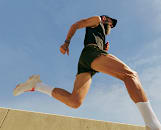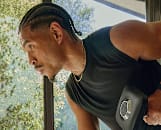
nensuria / iStock / Getty Images Plus via Getty Images
Is There an ‘Ideal’ Time to Eat After Finishing a Workout?
An answer for those who feel famished and those have no appetite at all post-workout.
By Hillary Hoffower•
Why It’s Important to Eat After Exercise
How Long Should You Wait After Exercise to Eat?
What If You’re Not Hungry After Exercising?
Post-Workout Snack and Meal Ideas
The Takeaway
You just spent an hour in the gym, but all that hard work is only half the battle to meeting your health and fitness goals. The other half, meanwhile, lies in the kitchen. We know what to eat after a workout (complex carbs! protein! healthy fats!), but how about when to fuel up? Specifically, how long should you wait after exercise to eat?
Discover more ways to reach your goals with Peloton
While every person and workout is unique, there are a few nutrition timing guidelines to consider to help your body refuel and recover after exercising, whether you want to maximize gains or simply need to top off your energy stores after a tough training session. Keep reading for everything sports dietitians want you to know.
Why It’s Important to Eat After Exercise
Whether you’re sweating it out on the bike in a Peloton class, training for a marathon, or hitting up the leg press machine, you’ll likely need to fuel up after a workout. That’s because your muscles use glycogen, your body’s main form of energy, when you engage in longer or moderate- or high-intensity exercise. So by the time you’ve wrapped up your workout, you may feel fatigued because your glycogen stores have been depleted. Eating can help fix that by reviving your energy levels, explains sports dietitian Yasi Ansari, RDN.
“After a challenging workout, or a lighter workout completed after several hours without a meal or snack, food helps both to replenish energy stores and to kick-start recovery processes,” adds sports dietitian Kelly Jones, RD. “Priorities for post-workout fueling include rehydrating with fluid and possibly extra sodium, replenishing muscle energy stores via carbohydrates, and repairing muscle tissue with protein.”

Peloton App
Access thousands of classes with no equipment needed.
How Long Should You Wait After Exercise to Eat?
While the ideal post-workout fuel window varies based on your unique energy needs and other personal factors, you should generally eat within an hour of exercising and then eat something again within two to four hours after working out, Ansari says. “I like recommending a snack or meal within an hour of training because this is typically when the body’s ability to readily absorb more carbs and protein is enhanced,” she explains. This is often referred to as the “anabolic window,” which is the short time window after a workout when your body is in an “anabolic” or muscle-building state, which is said to be optimal for muscle gains.
If you can eat your next meal during this time frame, Ansari says you don’t need to worry about eating again. But if you only have time for a snack, then try to have a meal within the next few hours. Recovery nutrition timing can impact any personal body composition goals, she says, and help decrease the risk of muscle breakdown—especially if you’re loading up on protein to build muscle after a strength training session.
“Ideally, the sooner you can recover, the better,” Ansari says, pointing out that waiting too long to refuel after a workout could prompt you to eat a bigger meal than normal in one sitting, which could cause a stomachache. It might also impact energy levels for tomorrow’s working: A small 2024 study published in the journal Acta Physiologica found that trained male athletes who consumed carbs shortly after exercising sustained higher-intensity athletic performance the next day, compared to those who waited three hours to have carbs.
Jones says that generally, the more intense your fitness routine, the faster you should try to eat something after exercising. “The need to refuel quickly increases as distance and number of workouts per week increase,” she explains.
For example, if you’re cycling outside or completing longer training runs regularly, Jones recommends eating more frequently. This may mean prioritizing a post-workout meal or snack immediately after finishing up, even if you ate a pre-workout snack shortly before training. On the other hand, if you’re enjoying shorter or less intense workouts like yoga and eating normal meals throughout the day, you probably don’t need an immediate post-workout snack.
Still, as with most things when it comes to exercise and nutrition, Jones says the “right” time to eat after a workout largely depends on your personal energy and protein needs, your unique health and fitness goals, the last time that you ate, and how much you ate.
“Two people might complete the same hour-long cycling class, with one having had a standard breakfast 90 minutes before and the other having had just a banana 90 minutes before,” she says. “The one who had a full meal may not need to eat again for 60–90 minutes, while the person who just had that small snack would likely need a recovery meal or snack in 30–45 minutes.”
What If You’re Not Hungry After Exercising?
Not feeling hungry after a workout is pretty normal. Post-exercise appetite suppression is especially common after high-intensity exercise, longer-duration workouts, or training sessions performed in the heat. In cases like these, both Jones and Ansari recommend liquid nutrition with protein and carbs, which is especially helpful for those completing endurance training and races.
“This helps to replenish muscle carbohydrate stores, stabilize blood sugar levels, and prevent the body from potentially turning to muscle as fuel during early recovery,” Jones says. “Stabilizing blood sugar can also help intense cravings from coming on later, which can lead to overeating.”
Whether it’s a fruit and yogurt smoothie, protein shake, or tall glass of milk or soy milk, liquids containing easily digestible carbs and proteins supporting muscle growth can be easier to get down while helping you meet your needs. (If you opt for a protein shake, it’s smart to get your healthcare provider’s stamp of approval on any new supplements you try.)
Ansari advises monitoring what you can and cannot tolerate after exercising. “If you just completed a challenging cycling or running class and sense that you won’t feel well if you eat or drink anything immediately after training, give yourself some time and still aim to nourish yourself within the hour,” she says.
Post-Workout Snack and Meal Ideas
“When it comes to recovery meals, carbs and protein are still the stars,” Jones says, adding that it’s more important to include high-quality carbs rich in fiber (such as whole grains or sweet potatoes) in addition to produce for more fiber, nutrients, and antioxidants. Lean meat is also a great source of protein if you just finished lifting weights. And don’t forget to add “some form of unsaturated fat to help regulate healthy inflammatory responses,” she suggests, whether that’s nuts, seeds, oils, or fatty fish like salmon or tuna.
Ansari recommends aiming for at least 20 grams of protein and doubling this among carbs if you worked out for longer than an hour or with high intensity.
Looking for some inspiration? Ansari and Jones share several delicious ideas on what to eat after a workout:
Greek yogurt with berries and a handful of granola
A protein shake with bowl of fruit and flaxseeds
Oatmeal made with protein powder, topped with fruit and slivered almonds
A deli-meat sandwich with a cup of fruit
A turkey burger with a bun and side of fruit
Hummus with pretzels and a banana with nut butter
Fruit smoothies made with Greek yogurt or protein powder
Scrambled eggs with an English muffin and fruit
Tuna with avocado paired and bread or rice cakes
Tofu with side of roasted potatoes and salad topped with nuts and avocado
Roasted edamame and crackers
A rice bowl with grilled salmon, asparagus, and your favorite dressing
Protein pasta with a crumbled tempeh bolognese sauce and broccoli
A veggie omelet with sourdough
The Takeaway
Refueling your body after a workout is important to replenish your energy and repair muscle tissue. While you should typically eat within an hour of working out (and maybe again a few hours later if you only had a snack or exercised vigorously), it all depends on your energy levels, whether you have an appetite, and your personal nutrition needs and fitness goals. Still, the sooner the better—just make sure you’re prioritizing carbs and protein with a side of fiber and healthy fats. If you’re not super hungry after a workout, you can get away with a carb- and protein-friendly liquid beverage.
This content is for informational and educational purposes only and does not constitute individualized advice. It is not intended to replace professional medical evaluation, diagnosis, or treatment. Seek the advice of your physician for questions you may have regarding your health or a medical condition. If you are having a medical emergency, call your physician or 911 immediately.
Get our latest health stories straight to your inbox
Enter your email to get articles, expert-backed tips, and updates from Peloton sent to your inbox.
By providing your email address, you agree to receive marketing communications from Peloton.
For more about how we use your information, see our Privacy Policy.








